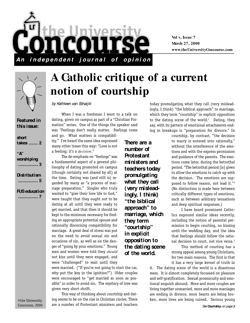The God gap in the workplaces of the world
by Peter Cole
One year ago, I wrote in and stated that Franciscan University must prepare its students for the work force by encouraging classes with a vocational slant to them. Classes in computer education, business and professional writing courses, and practical internships are important, and need to be given priority if our graduates are to compete in the global economy and—more importantly—to spread the gospel using the tools of the time. (St. Maximilian Kolbe is a wonderful example in the way he used state of the art machinery and instruments to spread his work on Our Lady.)
But, with that being said, I can see very clearly why a good wholesome liberal arts program is needed as the proverbial backbone for our students. Take the following examples as a indicator of what a total professional-courses-only approach might have.
In a business course I took at a junior college, the issue of medical ethics was addressed. One student and I argued about the function of the hospital. I stated that it existed to save lives. This lady shook her head and said its function was to make money, and if someone died, oh well. Our teacher gave no support for either argument. This same teacher, in training future business managers and administrators, discussed a case where a train car was robbed over the Thanksgiving holiday, because the workers were on a holiday with family and friends. His view was that the manager should have paid the time and a half for the workers to get the car unloaded. The training was completely centered on money and doing what had to be done in order to get more. Ethics were relative. Family life was seen as less important than making money. My vocational-only training was full of “what’s in it for me.”
Liberally educated individuals will recognize the reason why people work. While it is true that the liberally educated manager must make a profit to keep in business, the focus will also be on the dignity of the person. If the person is given such dignity, greater dignity would be accorded for God. Living a life of worship and prayer, keeping God’s commandments and those of the Church, and acknowledging that God is the Ultimate Authority in matters of ethics and faith will be present.
Our university community must promote liberal education in order to bring about God’s Kingdom on earth. We have lost God in the work place. Actually, I doubt He was ever there. Now we must bring Him in, to restore our businesses to an ethical and faith-filled place where the simple values of faith, family, and friends are given priority.
Peter Cole, Masters in Education Program


